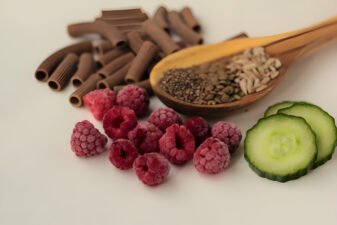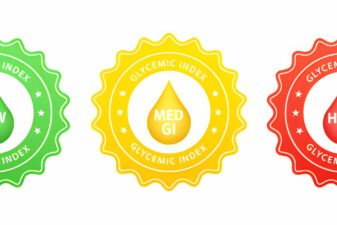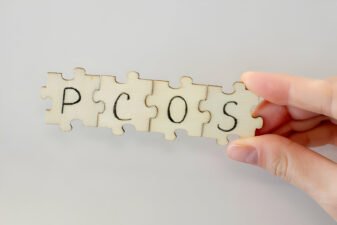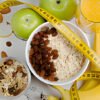Recommended Nutrition Balance of Carbs, Fats and Protein
As a rough guide to overall nutritional intake, PCOS patients who are not obese are advised by experts to eat about 50 percent of their calories in the form of healthy carbohydrates, 30 percent in the form of healthy fats and the balance in healthy protein. PCOS patients suffering from obesity should aim for about 40 percent of calories as carbs, 30 percent protein and 30 percent fat.
PCOS Diet: Best Carbohydrates
Choose low-GI whole-grain starches (dense wholegrain breads, brown rice, basmati rice, wholewheat pasta, noodles, sweet potatoes) rather than refined or processed starches (white bread, white rice, white pasta, potatoes) and whole fruit rather than fruit juice. Higher fiber foods (especially foods rich in soluble fiber) cause a slower rise in blood-sugar. For example, 1/2 cup of All Bran (10 grams of fiber) is better than cornflakes (1 gram fiber). An apple (4 grams of fiber) is better than apple juice which contains no fiber. Best sources of soluble fiber include apples, oats and beans.
Eat plenty of vegetables and beans. Not only are veggies packed with micronutrients like vitamins, minerals and phytochemicals, they are low in calories and (usually) have a very low GI value.
If possible, combine some fat and protein with the carbohydrate (starch or fruit). This will slow the rise of blood sugar from the carbohydrate. For example, eat toast with two teaspoons of peanut butter rather than toast with jam.
Choose lower-GI snacks. Instead of donuts, muffins, cakes, cookies, candy, sweets, jams, regular sodas, sugar and honey, switch to snack-foods like: fresh fruit, chopped veggies, sourdough muffins, oatmeal cookies, banana, bowl of All-Bran, low-fat yogurt, unsweetened canned fruit, nuts and seeds, dried fruit, baked tortilla chips and salsa, hummus, wholewheat pita with salad and light mayonnaise, and water.
PCOS Diet: Best Fats
The healthiest fats/oils come from UNREFINED vegetable sources or oily fish.
- For cooking, choose extra virgin olive oil
- For salads, choose from flax oil, canola oil, soy oil, extra virgin olive oil, wheatgerm oil, walnut oil or hemp seed oil.
- Eat regular helpings of oily fish like salmon, mackerel, herring, sardines, tuna.
[Note: Flax seed oil, hemp seed oil, canola oil and oily fish are great sources of one of the key essential fatty acids, omega-3. This type of fat is good for heart health and weight reduction, and offers a range of other metabolic health benefits.]
If you want to reduce weight, a good type of oil to use in cooking is a “Fat-Spray.” Fat-sprays typically provide 1 calorie, per spray/squirt. This compares with 120 calories per tablespoon of regular cooking oil.
PCOS Diet: Best Proteins
Protein is found in many foods, but the best type of protein is low in saturated fat. Good protein choices include: fish, lean beef, lean ham, egg whites, whole eggs, chicken breast, turkey breast, pulses, beans, nuts, seeds, soy products and vegetarian protein foods such as quorn and seitan.
For an excellent low glycemic plan for PCOS, see Low-GI Diet
Importance of Exercise
Regular physical exercise is essential for any weight reduction plan, and is especially important for all PCOS patients. Studies show that regular aerobic exercise workouts benefit insulin resistance as well as a range of health indicators like serum cholesterol, blood pressure and cardiovascular function. Weight or strength training improves insulin resistance and metabolic rate. All these benefits impact on polycystic ovary syndrome. For optimum benefit, take 30-60 minutes combined exercise on most days.










